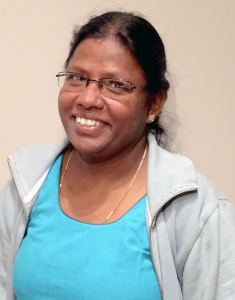“Women have to be respected”
“Women have to be respected”
We interviewed Mary Viyakula from the Indian non-governmental organisation SAVE about the Partnership Initiative in Tamil Nadu, about her personal goals in life and workers’ rights.
Seventeen percent of all employees in India work in the textile and garment sector. The centre of yarn production is in the South Indian state of Tamil Nadu, where approx. 2,000 spinning mills are located. About eighty percent of all spinning mill workers are women, including minors. The lower tiers in the supply chain, such as spinning mills, often have unacceptable working conditions. In many cases, workers often have to do excessive overtime, and the payment of the official minimum wage cannot be ensured by now. In addition to that sexual harassment and lack of freedom of association pose a threat, especially for young women.
Seventeen percent of all employees in India work in the textile and garment sector. The centre of yarn production is in the South Indian state of Tamil Nadu, where approx. 2,000 spinning mills are located. About eighty percent of all spinning mill workers are women, including minors. The lower tiers in the supply chain, such as spinning mills, often have unacceptable working conditions. In many cases, workers often have to do excessive overtime, and the payment of the official minimum wage cannot be ensured by now. In addition to that sexual harassment and lack of freedom of association pose a threat, especially for young women.
The local implementing partner of the Partnership Initiative in Tamil Nadu is the non-governmental organisation SAVE. Mary Viyakula lives in the Tamil Nadu region and has been working for SAVE for years. She talked to us about her personal motivation and explained what the joint engagement in Tamil Nadu is all about.
 What is your motivation to work for SAVE?
What is your motivation to work for SAVE?
Mary: My motivation came from the people I met. A lot of workers in factories are not able to make a decent living for their children, so the children end up in factories instead of going to school. If the conditions in the factories improve, the children will automatically get the chance to get an education. So this is what I have identified to concentrate on, and that is why I got involved in labour rights education.
What is the goal of the joint initiative with the Textile Partnership?
Mary: Under the umbrella of the Multi-Stakeholder Initiative Tamil Nadu (MSI-TN) we aim to improve the working conditions in spinning mills and work in three areas. We promote dialogue among relevant stakeholders in the local textile industry to improve the enforcement of existing law and to make clear what the rights of workers are. We also train workers and management in factories about labour rights and support the establishment of complaints committees and grievance redress procedures. Furthermore, the partnership initiative will train state labour inspectors who will align inspections with international standards and improve their quality.
Dialogue and in-factory training serve to raise awareness on labour rights. In addition to that, grievance redress procedures need to be in place.
Mary: That’s right. With the in-factory training we would particularly like to address issues for young women in the textiles and garment industry: Their employment relationships, their working hours, the payment of a living wage, their freedom of movement and employment benefits. We face major challenges in the factories, for example, existing law is often ignored. In particular, young workers are frequently unaware of their own rights, and of course, awareness is the first step in addressing violations. However, there is no mechanism in place to investigate their complaints. The Initiative of the Partnership for Sustainable Textiles directly involves the young women inside the factory in setting up an appropriate mechanism to provide redress for grievances.
What are your hopes for the Tamil Nadu region in the future?
Mary: That`s a good question! All working women have to be respected; they should feel free to work, feel that they’re in a dignified labour situation. This program should help! Dignified women workers who should not be in confined situations. Women have to be respected.
Thank you!



